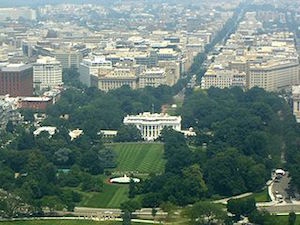The Department of Homeland Security (DHS) announced a new policy towards certain undocumented immigrants, giving them an opportunity to obtain employment authorization and relief from deportation. The policy addresses many of the benefits that would have been available to young immigrants under the DREAM Act,. Critics say the policy oversteps the executive branch’s authority, while supporters say it is a vital step in creating a sensible immigration system and improving the economy. The policy only exists at the executive level, enacted through “prosecutorial discretion.” A future administration, or even this one, could change the policy again with little public input. It is a step in the right direction for thousands of immigrants, but it may not be a long-lasting solution.
The new policy, announced on June 15, 2012, creates a process of “deferred action” for qualifying immigrants. This means that, for so long as individual immigrants meet the policy’s criteria, the government will not seek to deport them. Deferrals are available for two-year periods, with possible renewal. People receiving deferrals may also obtain employment authorization during the deferral period. The policy could affect up to 800,000 immigrants.
Deferred action is available to qualifying people who are under the age of thirty, who came to the U.S. before the age of sixteen, who have resided here continuously for at least five years prior to June 15, who were physically present in the U.S. on June 15, and who do not have any serious criminal history or national security concerns. They must be either have a high school diploma, a G.E.D., current enrollment in school, or an honorable discharge from the Armed Forces.
The policy is reminiscent of the Development, Relief, and Education for Alien Minors (DREAM) Act, which would give undocumented immigrants who arrived in the U.S. as children a path to legal permanent residence if they meet certain educational or military service requirements. The DREAM Act has been introduced in Congress several times since 2001, but has never passed. Much of the criticism of the new policy focuses on its constitutionality. Specifically, critics are asking if the executive branch of the federal government can enact many of the same reforms without Congress. Prosecutorial discretion is well within the authority of the White House and DHS, in that the government is generally free not to prosecute cases. Whether DHS can issue work authorizations without legislative authority, however, may prove to be an issue.
The most important difference between prosecutorial discretion and immigration legislation is that the former does not give an immigrant any new immigration status or substantive rights. It is simply a decision by federal law enforcement not to prosecute a person. It does not give an immigrant a new path to legal temporary or permanent residence, nor to citizenship. The policy could change in the future, which creates a dilemma for many young undocumented immigrants as to whether they should come forward at all.
The United States immigration system is often complex and beset by politics. Contact Gus Shihab today online or at (888) 915-5057 to schedule a confidential consultation with a skilled and experienced Ohio immigration visa lawyer who can help guide you through the system.
More Blog PostsDeportations Continue Despite ICE’s Promise to Use Prosecutorial Discretion, Immigration Visa Lawyer Blog, June 8, 2012
Alternative Plan to DREAM Act Proposed in US House- STARS Act, Immigration Visa Lawyer Blog, June 1, 2012
Undocumented Students Rally in Detroit and Other Cities to Protest Deportation, Immigration Visa Lawyer Blog, March 23, 2012
Photo credit: ‘White House from South’ by Nilington [Public domain], via Wikimedia Commons.

